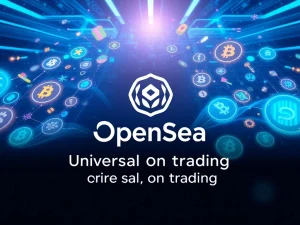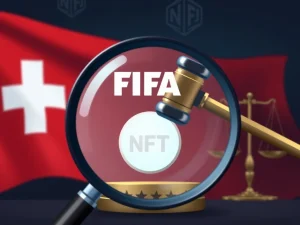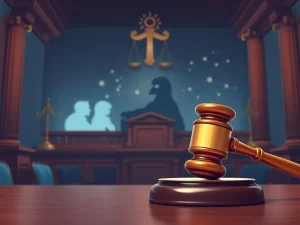Landmark Victory: Nate Chastain’s OpenSea Insider Trading Conviction Overturned

In a development that has sent ripples through the cryptocurrency and NFT communities, a US federal appeals court has delivered a landmark decision, overturning the conviction of former OpenSea product manager, Nathaniel Chastain. This ruling in the Nate Chastain conviction case is not just a win for Chastain but potentially sets a significant benchmark for how insider trading and digital assets are viewed under federal law. For anyone invested in the evolving legal landscape of crypto, this outcome is a must-watch.
The Nate Chastain Conviction Journey: From Charges to Overturn
The journey of Nathaniel Chastain from a high-profile conviction to a successful appeal has been a focal point for many tracking legal developments in the crypto space. Chastain was initially charged in June 2022, accused of leveraging confidential information from OpenSea, the world’s largest NFT marketplace, to gain an unfair advantage in the market. The allegations centered on his practice of purchasing NFTs that he knew would be featured on OpenSea’s homepage, only to sell them for a profit once their prices surged due to the increased visibility. This activity, dubbed ‘insider trading’ by prosecutors, led to his conviction in 2023 for wire fraud and money laundering.
Following his conviction, which resulted in a three-month prison sentence and a $50,000 fine, Chastain promptly appealed. His defense argued that the information he used—details about upcoming NFT listings—did not constitute ‘property’ in the traditional sense, a crucial element for a wire fraud conviction. The recent decision by the United States Court of Appeals for the Second Circuit validates this argument, highlighting a critical flaw in the initial jury instructions.
Unpacking the OpenSea Insider Trading Case: What Was at Stake?
The core of the OpenSea insider trading case revolved around the definition of ‘property’ in the context of digital information. Prosecutors argued that OpenSea’s confidential information about featured NFTs was indeed its property, and Chastain’s use of it for personal gain constituted misappropriation. However, the appeals court scrutinized this interpretation. The court’s decision hinged on the principle that for a wire fraud conviction, the misappropriated interest must be connected to ‘traditional property rights.’
The court’s ruling stated: “Chastain argues that the district court erred by instructing the jury that it could find him guilty of defrauding OpenSea of its property if he misappropriated an intangible interest unconnected to traditional property rights. He maintains that this error affected the jury’s decision. We agree.” This distinction is pivotal. It suggests that merely using confidential information, while potentially unethical, does not automatically equate to defrauding someone of their ‘property’ under current federal fraud statutes, unless that information is directly tied to a tangible or traditional property interest.
Setting an NFT Legal Precedent? Implications for Digital Assets
This ruling has profound implications, potentially setting an NFT legal precedent for how digital assets and the information surrounding them are treated in future legal battles. The court’s emphasis on ‘traditional property rights’ challenges the expansive view prosecutors often take when applying existing laws to novel digital environments. It raises questions about what exactly constitutes ‘property’ in the decentralized and often intangible world of NFTs and other digital assets.
For the broader NFT market, which has seen its trading volumes significantly decline since its 2021-2022 peak (OpenSea’s monthly volumes dropped from $5 billion in January 2022 to roughly $82 million in June), this case offers a moment of clarity, or at least, a new set of questions for legal professionals. It underscores the ongoing struggle of applying decades-old legal frameworks to rapidly evolving technology. Is confidential information about an NFT listing the same as, say, a company’s trade secrets or financial data? The court seems to suggest there’s a nuanced difference that needs to be properly addressed in jury instructions.
The Nuances of the Wire Fraud Ruling: Jury Instructions Under Scrutiny
The heart of the appeals court’s decision lay in the flawed jury instructions related to the wire fraud ruling. The court found that the jury could have convicted Chastain based solely on unethical conduct, rather than requiring proof that he misappropriated a traditional property interest. This distinction is critical in federal fraud cases. Wire fraud statutes require a deprivation of ‘property’ or ‘money,’ and the appeals court found that the jury was not properly guided on what constitutes such property in this context.
Key takeaways from the court’s reasoning:
- Definition of Property: The court clarified that not all confidential information qualifies as ‘property’ under federal fraud statutes. There must be a clear link to traditional property rights.
- Jury Instruction Error: The trial court’s instructions were deemed too broad, allowing the jury to convict for conduct that was merely unethical, without necessarily meeting the legal threshold for property misappropriation.
- Impact on Future Cases: This ruling emphasizes the need for precise legal definitions and jury guidance when prosecuting cases involving novel digital assets and information.
This outcome highlights the challenges prosecutors face when attempting to fit new forms of digital value and information into existing legal definitions designed for the physical world.
Broader Implications for Digital Asset Regulation and Market Integrity
The overturning of the Nate Chastain conviction sends a powerful signal regarding the future of digital asset regulation. While it doesn’t mean insider trading in crypto is permissible, it does mean that prosecutors will need to be more precise in how they define ‘property’ and ‘confidential information’ when bringing charges in the digital realm. This case could influence how future insider trading cases involving NFTs, cryptocurrencies, and other digital assets are structured and argued.
For the industry, it underscores the continued need for clear regulatory frameworks tailored to digital assets. Without explicit laws addressing these unique scenarios, applying traditional statutes can lead to inconsistent or overturned rulings. As the crypto market matures and more traditional financial players enter the space, the demand for regulatory clarity will only intensify. This case serves as a reminder that the legal system is still catching up to the rapid pace of innovation in the digital asset landscape.
Conclusion: A Pivotal Moment for Crypto Law
The overturning of Nathaniel Chastain’s conviction marks a pivotal moment in the legal history of digital assets. It doesn’t absolve the ethical concerns surrounding insider trading in any market, but it does clarify the stringent legal requirements for conviction under existing statutes. This decision will undoubtedly influence how future cases involving NFTs and other digital assets are prosecuted, forcing a more precise definition of ‘property’ in the digital realm. As the crypto ecosystem continues to evolve, this ruling serves as a crucial reminder that legal frameworks must adapt to address the unique characteristics of digital value and information, ensuring both market integrity and fair application of the law.








